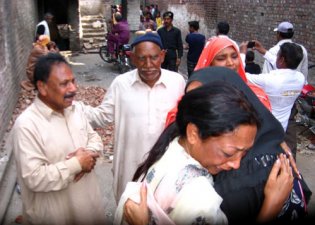Residents of a Christian community in eastern Pakistan, among them Seventh-day Adventists, are reeling after a mob torched their homes and businesses in response to alleged insults against Muhammad.
The unrest began last week after a report circulated that a young Christian man had committed blasphemy against Islam’s prophet. By March 9, the situation had escalated and thousands of protestors began setting fire to property owned by Christians in a Lahore neighborhood.
While some residents sustained injuries, there was no loss of life. Most Christians had earlier fled under threats of violence and police warnings to leave, a representative of the Adventist Church in Pakistan said.

Church property and the homes of Adventist members, however, sustained “tremendous damage,” church leaders said. The rented home of local Adventist Pastor Afzal Bhatti and his family was destroyed along with the homes and belongings of at least 40 Adventists.
Songbooks, Bibles and sound equipment at the local Adventist church were burned, but the building itself only withstood minor water damage as firefighters worked to control nearby blazes, an Adventist survey team reported.
At least 170 homes and businesses were torched, according to Associated Press reports.
Bhatti and his family were among residents who left as the mob headed for their community.
“In his haste, Pastor Bhatti left behind his cell phone and ID card,” a church representative said, adding that a protestor yanked the glasses off his face as he fled.
Bhatti and his wife, Parveen, returned the morning after the riots to comfort and pray with affected community members. Later, the family began the process of rebuilding their lives by purchasing necessities for work, study and ministry.
Earlier this week, the Punjab State government pledged to compensate each affected family with the equivalent of US$2,000. Since then, the federal government of Pakistan has promised an additional US$5,000 per family.
The Adventist Church and the Adventist Development and Relief Agency in Pakistan are assessing the situation and assisting members of the affected Christian community.
Less than five percent of Pakistanis are Christian, and blasphemy against the Quran or the prophet Muhammad can carry the death penalty. Religious liberty experts have observed that blasphemy laws are often used to repress religious minorities or settle personal disputes.
In 2011, Salmaan Taseer, a Pakistani businessman and politician, and Shahbaz Bhatti, the only Christian in Pakistan’s cabinet, were assassinated for their opposition to legislation against blasphemy. Religious freedom advocates have long urged Pakistan to ease its harsh controls on defamation of religion.
“We have always strongly opposed Pakistan’s blasphemy laws, which are the source of so much injustice in the country, especially for religious minorities and Muslim dissidents,” said John Graz, secretary-general of the International Religious Liberty Association.
“All religious liberty advocates should express solidarity with the affected families and encourage the government to reform this legislation,” he said. [Editor: Elizabeth Lechleitner for ANN]

